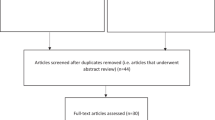Abstract
There is limited literature on the long-term impact of political activism on mental wellbeing in the context of childhood political trauma and subsequent forced migration. Such information is important for developing mental health services suitable to this population. This qualitative study contributes to this gap by exploring the experience of an understudied population: adult Jewish Argentinian immigrants to Israel, who as children experienced the military dictatorship in Argentina (1976–1983). Thematic textual analysis of narrative interviews revealed that in the case of participants who escaped with their parents as political exiles to Israel, political activism during childhood and adulthood can be both a risk and protective factor and affect a range of positive and negative long-term mental health outcomes including resilience and symptoms that appear as Complex Post-Traumatic Stress Disorder.

Adapted from Simich and Beiser’s [11] paradigm
Similar content being viewed by others
References
The US National Security Archive. Kissinger to Argentines on dirty war: “The quicker you succeed the better”. 2003. https://nsarchive2.gwu.edu/NSAEBB/NSAEBB104/index.htm.
Jahangir A. States of violence: nature of terrorism and guerilla warfare. New Delhi: Dominant; 2000. p. 66.
Kaufman E. Jewish victims of repression in Argentina under military rule (1976-1983). J Holocaust Genocide Stud. 1989;4:479–99.
DuBois L. The politics of the past in an Argentine working-class neighbourhood. J Latin Am Caribb Anthropol. 2005;10(2):460–2.
Cardenas S. Conflict and compliance: state responses to international human rights pressure. Pennsylvania: University of Pennsylvania Press; 2007. p. 52.
Nunca Más - Informe de la Conadep - Septiembre de 1984. http://www.desaparecidos.org/nuncamas/web/investig/articulo/nuncamas/nmas2_01.htm.
Tarica E. The Holocaust again? Dispatches from the Jewish “internal front” in Dictatorship Argentina. J Jewish Identities. 2012;5(1):89–110.
Ministry of Aliah and Integration. The Israeli immigration ministry research department, Statistic about the immigration from Argentina to Israel 1972-2016. 2017 (in Hebrew).
Sznajder M, Roniger L. From Argentina to Israel: escape, evacuation and exile. J Latin American Stud. 2005;37(2):351–77.
Rein R, Davidi E. Sport, politics and exile: protests in Israel during the World Cup (Argentina, 1978). J Hist Sport. 2009;26(5):673–92.
Simich L, Beiser M. Immigrants and refugee mental health in Canada: lessons and prospects. In: Bhugra D, Susham G, editors. Migration and mental health. Cambridge, UK: Cambridge University Press; 2011. p. 323–36.
Kirmayer LJ. Wrestling with the angels of history: memory, symptom, and intervention. In: Hinton A, Hinton D, editors. Genocide and mass violence: memory, symptom, and recovery. New York: Cambridge University Press; 2014. p. 388–420.
The UN Refugee Agency [UNHCR]. Who is a refugee? 2018. https://www.unrefugees.org/refugee-facts/what-is-a-refugee/.
Van der Kolk BA. Developmental trauma disorder: toward a rational diagnosis for children with complex trauma histories. J Psychiatr Ann. 2005;35:401–8.
Agaibi CE, Wilson JP. Trauma, PTSD, and resilience: a review of the literature. J Trauma Violence Abuse. 2005;6(3):195–216.
Berger R, Weiss T. The posttraumatic growth model: an expansion to the family system. J Traumatol. 2009;15(1):63–74.
Denzin NK, Lincoln YS. Methods of collecting and analyzing empirical materials, narrative inquiry. In: Denzin NK, Lincoln YS, editors. The Sage qualitative research. Thousand Oaks, California: Sage; 2005. p. 641–2.
Rosenthal G. Reconstruction of life-stories: principle of selection in generating stories for narrative interviews. In: Josselson R, Lieblich A, editors. The narrative study of lives. Newbury Park, CA: Sage; 1993. p. 59–91.
Lieblich A. Narrative research: reading, analysis, and interpretation, J Applied social research series, vol. 47. Thousand Oaks: Sage; 1998.
Lee ES. A theory of migration. J Demogr. 1966;3(1):47–57.
Boehnke K, Wong B. Adolescent political activism and long-term happiness: a 21-year longitudinal study on the development of micro-and macrosocial worries. J Pers Soc Psychol Bull. 2011;37(3):435–47.
Holtz TH. Refugee trauma versus torture trauma: a retrospective controlled cohort study of Tibetan refugees. J Nerv Mental Dis. 1998;186(1):24–34.
Goldfried MR. The corrective experience: a core principle for therapeutic change. In: Castonguay LG, Hill CE, editors. Transformation in psychotherapy: corrective experiences across cognitive behavioral, humanistic, and psychodynamic approaches. Washington, DC: American Psychological Association; 2012. p. 13–29.
Akhtar S. Comprehensive dictionary of psychoanalysis. London: Karnac Books; 2009. p. 122.
Courtois CA. Complex trauma, complex reactions: assessment and treatment. J Psychother. 2008;41(4):412–25.
Cloitre M, et al.. The ISTSS expert consensus treatment guidelines for complex PTSD in adults; 2012
Resick PA, et al. A critical evaluation of the complex PTSD literature: implications for DSM-5. J Trauma Stress. 2012;25(3):241–51.
Lev-Wiesel R, Amir M. Growing out of ashes: posttraumatic growth among Holocaust child survivors–is it possible. In: Calhoun LG, Tedeschi RG, editors. Handbook of posttraumatic growth: research and practice. New York: Psychology Press; 2006. p. 248–63.
Fazel M, et al. Prevalence of serious mental disorder in 7000 refugees resettled in western countries: a systematic review. J Lancet. 2005;365(9467):1309–13014.
Fazel M, et al. Mental health of displaced and refugee children resettled in high-income countries: risk and protective factors. J Lancet. 2012;379(9812):266–82.
Author information
Authors and Affiliations
Corresponding author
Additional information
Publisher's Note
Springer Nature remains neutral with regard to jurisdictional claims in published maps and institutional affiliations.
Rights and permissions
About this article
Cite this article
Gal, S., Hanley, J. The Long-Term Impact of Political Activism on Mental Wellbeing in the Context of Adult Immigrants Who Experienced Childhood Political Trauma. J Immigrant Minority Health 22, 982–987 (2020). https://doi.org/10.1007/s10903-019-00962-x
Published:
Issue Date:
DOI: https://doi.org/10.1007/s10903-019-00962-x




